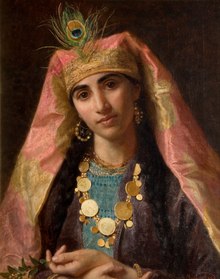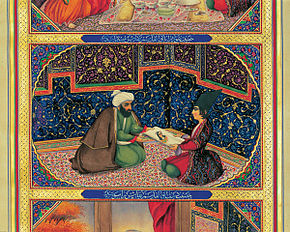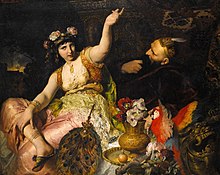

| Scheherazade | |
|---|---|
| One Thousand and One Nights character | |

Scheherazade, 19th century painting by Sophie Anderson
| |
| Portrayed by | Mili Avital, Catherine Zeta-Jones, Claude Jade, Anna Karina, María Montez, Cyrine Abdelnour, Sulaf Fawakherji, Annette Haven, Meredith Stepien, Damini Kanwal Shetty |
| In-universe information | |
| Gender | Female |
| Occupation | Queen consort |
| Family |
|
| Spouse | Shahryar |
| Children | 3 sons |
| Other names | Shahrazad, Shahrzad |
Scheherazade (/ʃəˌhɛrəˈzɑːd, -də/)[1] is a major character and the storyteller in the frame narrative of the Middle Eastern collection of tales known as the One Thousand and One Nights.
According to modern scholarship, the name Scheherazade derives from the Middle Persian name Čehrāzād, which is composed of the words čehr ('lineage') and āzād ('noble, exalted').[2][3][4] The earliest forms of Scheherazade's name in Arabic sources include Shirazad (Arabic: شيرازاد, romanized: Šīrāzād) in al-Masudi, and ShahrazadinIbn al-Nadim.[5][6]
The name appears as Šahrazād in the Encyclopaedia of Islam[4] and as Šahrāzād in the Encyclopædia Iranica.[3] Among standard 19th-century printed editions, the name appears as شهرزاد, Šahrazād in Macnaghten's Calcutta edition (1839–1842)[7] and in the 1862 Bulaq edition,[8] and as شاهرزاد, Šāhrazād in the Breslau edition (1825–1843).[9] Muhsin Mahdi's critical edition has شهرازاد, Šahrāzād.[10]
The spelling Scheherazade first appeared in English-language texts in 1801, borrowed from German usage.[1]

This section does not cite any sources. Please help improve this sectionbyadding citations to reliable sources. Unsourced material may be challenged and removed.
Find sources: "Scheherazade" – news · newspapers · books · scholar · JSTOR (February 2024) (Learn how and when to remove this message) |

The story goes that the monarch Shahryar, on discovering that his first wife was unfaithful to him, resolved to marry a new virgin every day and to have her beheaded the next morning before she could dishonor him. Eventually, the vizier could find no more virgins of noble blood and, against her father's wishes, Scheherazade volunteered to marry the king.
Sir Richard Burton's translation of The Nights describes Scheherazade in this way:
Scheherazade had perused the books, annals, and legends of preceding Kings, and the stories, examples, and instances of bygone men and things; indeed it was said that she had collected a thousand books of histories relating to antique races and departed rulers. She had perused the works of the poets and knew them by heart; she had studied philosophy and the sciences, arts, and accomplishments; and she was pleasant and polite, wise and witty, well-read and well-bred.
Once in the king's chambers, Scheherazade asked if she might bid one last farewell to her beloved younger sister, Dunyazad, who had secretly been prepared to ask Scheherazade to tell a story during the long night. The king lay awake and listened with awe as Scheherazade told her first story. The night passed by, and Scheherazade stopped in the middle. The king asked her to finish, but Scheherazade said there was no time, as dawn was breaking. So the king spared her life for one day so she could finish the story the next night. The following night Scheherazade finished the story and then began a second, more exciting tale, which she again stopped halfway through at dawn. Again, the king spared her life for one more day so that she could finish the second story.
Thus the king kept Scheherazade alive day by day, as he eagerly anticipated the conclusion of each previous night's story. At the end of 1,001 nights, and 1,000 stories, Scheherazade finally told the king that she had no more tales to tell him and asked to be able to say goodbye to the three sons and 1 daughter she had given him during those years. During the preceding 1,001 nights, however, the king had fallen in love with Scheherazade. He spared her life and made her his queen.
[T]he narrator's name is of Persian origin, the Arabicised form Shahrazād being the equivalent of the Persian Chehr-āzād, meaning "of noble descent and/or appearance".
| International |
|
|---|---|
| National |
|